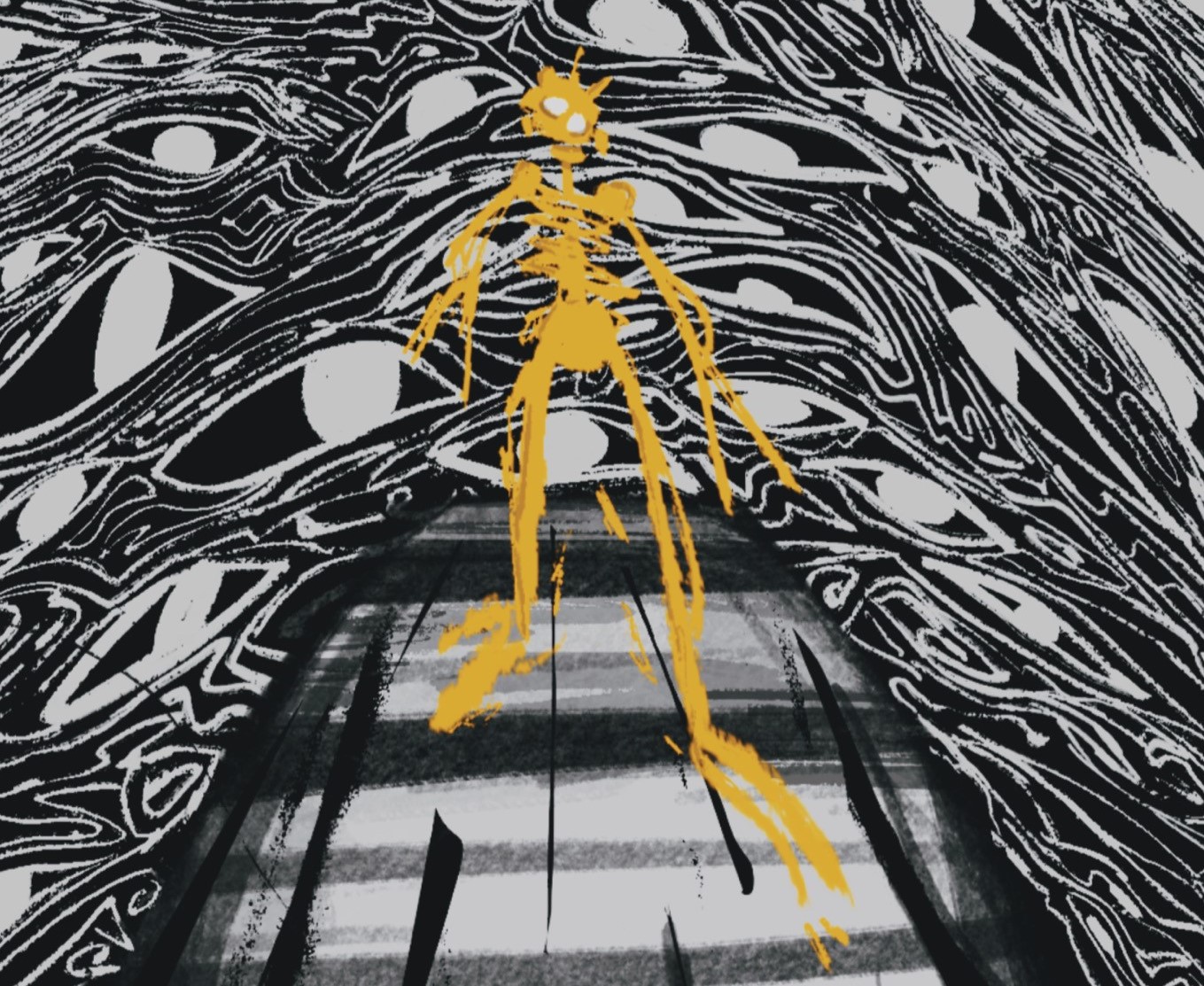Il rischio di cambiare
by Pietro Morosi (2005) Liceo Sesto Properzio, Assisi/Italy on 2022-03-15

The following article was written as part of the trait d`union online workshop “The fight against discrimination and the discussion on how to” between editors from Liceo Sesto Properzio di Assisi/Italy and Gisela-Gymnasium Munich/Germany in March 2022.
Painting by Gloria Vertecchi
IL RISCHIO DI CAMBIARE
La vita è fatta di cambiamento. La vita è Il Cambiamento. La necessità di cambiare è l’unica costante della nostra esistenza.
Quante volte abbiamo sentito frasi del genere e quante volte abbiamo realizzato che è tutto vero? Ma soprattutto, quante volte abbiamo pensato di voler cambiare noi stessi, le nostre abitudini, o addirittura il mondo? Eppure, la maggior parte delle volte non abbiamo fatto nulla o abbiamo rimandato: abbiamo lasciato soccombere questa idea, sprecato opportunità, buttato parole al vento; come se questo desiderio non ci appartenesse veramente, come se fosse qualcosa di troppo grande che abbiamo detto per scherzo. Ma perché rinunciare? Dopotutto, cambiare è qualcosa che facciamo per migliorarci, per stare bene con noi stessi, ed è anche spesso un dovere per stare bene con gli altri (e per gli altri).
La verità è che in fondo abbiamo paura del cambiamento: prendere decisioni, evolverci, nel bene e nel male, che lo vogliamo o meno, comporta l’abbandono delle nostre abitudini e dei nostri modi di fare, di ciò su cui abbiamo fondato parte della nostra vita. E non importa che questo possa portarci a nuove esperienze e nuovi traguardi; ci sarà sempre quella parte un po’ egoistica di noi che non vorrà uscire dalla propria comfort zone, adattarsi al nuovo, rinunciare a “stare bene” in un certo momento, in un determinato posto, perdere tutto per andare a trovare se stessi da qualche altra parte.
E’ quasi paradossale che noi umani abbiamo ancora paura ad adattarci al nuovo quando viviamo in una società che ci chiede ormai costantemente di essere pronti al cambiamento, di muoverci, di innovarci, di rivedere le nostre abitudini costantemente, di incontrarci col nuovo e renderlo parte di noi stessi.
Forse è questa la prova che la società è cambiata tanto nei secoli, ma l’uomo in fondo è rimasto quello di mille, duemila anni fa: che appena qualcosa stravolge i suoi schemi, anche la più piccola (persone, eventi, possibilità da cogliere al volo o anche il semplice passare degli anni) si sente sotto pressione, non sa più come muoversi e quindi resta fermo, o agisce in modo sconsiderato. E’ così che nascono anche, in ambiti più grandi, le guerre, l’ intolleranza , il razzismo, l’ indifferenza, l’odio: per la paura che il nuovo, per quanto possa farci bene, cambi noi e chi ci sta attorno, che distrugga quella poca sicurezza che abbiamo.
Le nuove generazioni in particolare vivono questa pressione, poiché non è stato chiesto loro se vogliono cambiare il mondo, piuttosto è stato ordinato loro di farlo. C’è quasi una sorta di rabbia nei confronti di chi c’era prima, perché ha avuto paura del cambiamento e lo ha rimandato, anche se sapeva prima o poi di doverlo affrontare. Non è voluto uscire dalla sua bolla, non ha pensato veramente né a sé né agli altri. Anzi ha scaricato le sue responsabilità su qualcun’ altro, che come lui ha paura di uscire dalla sua comfort zone, di cambiare, eppure lo deve fare perché sa che non c’ è altra alternativa; perché la vita è così, e chi non ha il coraggio di cambiare non vive veramente.
THE RISK OF CHANGING
Life is made of change. Life is Change. The need to change is the only constant element of our existence.
How many times have we heard phrases like that and how many times have we realised that it is all true? But mostly, how many times have we thought to change ourselves, our habits or even the world? And yet, we haven’t done anything most of the time, we have postponed: we’ve let this idea succumb, we’ve wasted opportunities, thrown words away; as if this desire didn’t really belong to us, as if it were something too big that we said as a joke. But why give up? After all, change is something we make to improve ourselves, to be fine with ourselves and it is also often a duty, to feel good with others (and for others).
The truth is, after all, we`re afraid of changing: making decisions, evolving, for good or bad, whether we want it or not, involves abandoning our habits and our way of doing things, upon which we founded a part of our lives. And it doesn’t matter if this could lead us to new experiences and goals; there’ll always be that small egoistic part of us that won’t come out of its comfort zone, adapt to novelties, that won’t give up on “feeling good” in a certain moment, in a given place, lose everything to go and find ourselves somewhere else.
It is almost paradoxical that we humans are still afraid to adapt to novelties when we live in a society that asks us to be always ready to change, to move, to innovate ourselves, to constantly revise our habits, to meet the new and make it a part of us.
Perhaps, this is the proof that society has changed so much over the centuries, but in the end, man has remained the same as one thousand, two thousand years ago: that when something twists his patterns, even the tiniest (people, events, possibilities to catch or even the simple passing of the years) he feels under pressure, he doesn’t know how to move anymore and so he stands still or acts reckless. This is how, in bigger contexts, phenomena like wars, intolerance, indifference, racism, hate arise: for the fear that novelties, as much as they can do good, can change us and who’s around us, and that they can destroy that little confidence we have.
Young generations, in particular, live this pressure, because they haven’t been asked to change the world, they have rather been ordered to do it. There’s almost a sort of rage against those who were here on the Earth before because they were afraid of changing and so they delayed it, even if they knew that eventually they would face it. They didn’t want to come out of their bubble, they didn’t really think either of themselves or the others. On the contrary, they passed their responsibility on to someone else, who like them, was afraid of coming out of his comfort zone, of changing; and yet, they must do it because they know there’s no alternative, because that’s life, and who doesn’t have the courage to change, doesn’t really live.
DAS RISIKO EINER VERÄNDERUNG
Das Leben besteht aus Veränderung. Das Leben ist Veränderung. Die Notwendigkeit zu ändern ist die einzige Konstante unserer Existenz. Wie oft haben wir ähnliche Sätze gehört und wie oft haben wir realisiert, dass sie wahr sind? Aber vor allem, wie oft haben wir gedacht, uns selbst, unsere Gewohnheiten oder sogar die Welt zu ändern? Doch wir haben meistens nichts gemacht, sondern alles verschoben: wir haben diese Idee fallen lassen, Möglichkeiten verpasst, Wörter verschwendet, als gehörte uns dieser Wunsch nicht wirklich, als wäre er etwas zu groß, als wäre er nur ein Witz. Aber warum aufgeben? Schließlich ist ändern etwas, das wir machen, um uns zu verbessern, und es ist auch oft eine Pflicht, um uns mit den anderen wohl zu fühlen.
Die Wahrheit ist, dass wir tief im Inneren Angst vor Veränderungen haben. Entscheidungen zu treffen, sich weiterzuentwickeln, ob wir es wollen oder nicht, bedeutet, unsere Gewohnheiten und Vorgehensweisen aufzugeben, die Dinge, auf die wir einen Teil unseres Lebens aufgebaut haben. Auch wenn dies zu neuen Erfahrungen und neuen Zielen führen kann… Es wird immer diesen leicht egoistischen Teil von uns geben, der uns nicht aus der Komfortzone herauskommen, uns nicht an das Neue anpassen lässt: Der Mensch hat Angst, sein "Wohlfühlen" in einer bestimmten Zeit, an einem bestimmten Ort zu verlieren, vielleicht sogar alles zu verlieren, sich woanders wiederzufinden.
Es ist fast paradox, dass wir Menschen noch Angst haben, uns an Neuheiten anzupassen, weil wir in einer Gesellschaft leben, die uns permanent zwingt, immer bereit für Veränderungen zu sein, uns zu erneuern, unsere Gewohnheiten ständig zu überprüfen, dem Neuen zu begegnen und es zu einem Teil von uns zu machen.
Die Gesellschaft hat sich über Jahrhunderte hinweg sehr verändert; während der Mensch derselbe geblieben ist, wie vor tausend Jahren. Wenn etwas aus der Reihe tanzt, auch die kleinste Sache (neue Personen, Ereignisse, Möglichkeiten zu ergreifen oder nur der Lauf der Jahre), fühlt man sich unter Druck, man weiß nicht mehr, ob man sich bewegen oder stillstehen soll und reagiert rücksichtslos. So entstehen auch in größeren Zusammenhängen Krieg, Intoleranz, Gleichgültigkeit, Rassismus und Hass: aus Angst vor dem Neuen, das zwar gut für uns sein kann, uns aber verändert und die wenigen Gewissheiten, die wir haben, zerstört.
Insbesondere erleben die neuen Generationen diesen Druck, da man sie nicht gefragt hat, ob sie die Welt ändern wollen, sondern ihnen befohlen hat, es zu tun. Es gibt geradezu eine Art Zorn auf frühere Generationen, die aus Angst vor Veränderung viele Dinge verschoben haben, obwohl sie wussten, dass sie sie eines Tages angehen mussten. Sie sind nicht aktiv geworden, sie haben weder an sich noch an die anderen wirklich gedacht. Diese früheren Generationen haben ihre Verantwortung auf andere abgewälzt, die, wie sie selbst, Angst hatten, ihre Komfortzone zu verlassen und etwas zu verändern. Jedoch hätten sie dies machen müssen, weil es keine Alternative gibt, weil das Leben so ist und weil, wer keinen Mut hat, etwas zu verändern, nicht wirklich lebt.




